“The blame is his who chooses,” wrote Plato in The Republic, “God is blameless.” History certainly provides plenty of examples of authoritarian leaders (some with god delusions) blaming everyone but themselves for their leadership failures, especially in the realm of economics. Take Kim Jung Un, leader of the Democratic People’s Republic of Korea (DPRK), or North Korea, if you prefer, who certainly fits this pattern and keeps providing examples of a despotic strongman hiding his incompetence behind the very accusations he throws at others.
The North Korean economy has struggled for decades under the consequences of Kim‘s provocative foreign policy and widespread corruption. Of course, he inherited an economic disaster area from his father and grandfather, so one could charitably say it’s not all his fault. But Kim’s bellicose and somewhat superfluous weapons programmes, decried as illicit and worthy of severe economic sanctions by the international community, consumes an extraordinary amount of resources. What’s more, the resources are used up at the expense of traditional economic pillars like domestic infrastructure, such as public health, and civic improvement programs. Kim funnels whatever scarce resources are left over or can be squeezed from somewhere into procuring exorbitant luxury goods for his family and most favoured advisors, leaving far too little to fund basic necessities for his people.
It’s worth noting, however, that education and health care (such as they are) are free (children there must attend school for 11 years) and income tax was abolished in 1974. What’s more, North Korea boasts the highest percentage of doctors for the size of population of any developing country: 3.7 per 1,000 citizens. Another plus is that most people living there are literate. It sounds idyllic. It isn’t.
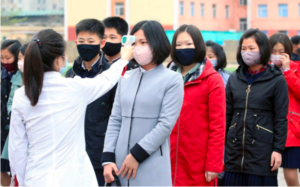
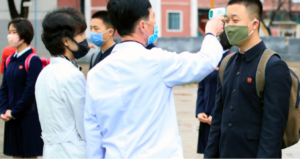
The ongoing global coronavirus pandemic (COVID-19) has also exposed the inadequacies of Kim‘s leadership. His “military first” policies directly contribute to the misery of the North Korean people, who desperately need better domestic programs such as improved public health care and disease prevention measures. Yet this summer, Kim, in the long tradition of dictators, blamed the disastrous state of the economy on North Korea‘s mid-level elites: those individuals – you might call them ‘middle management’ – with a limited amount of power and influence who also happen to be relatively well-off financially as a result of interpreting and putting into practice Kim’s corrupt and ineffectual policies. Effectively, they are North Korea’s ‘middle-class’. Kim says these cabinet and provincial party officials failed to prevent corruption in the free hospitals and free schools and financially mismanaged public budgets. Of course, the individuals singled out for his criticism had no authority to stop, let along reverse, the very corruption in which Kim engages; nor can they – or anyone else – magically conjure up successful outcomes based on meagre or non-existent budgets.

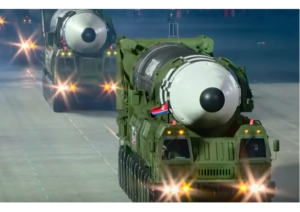
At an October 2020 rally to celebrate the 75th anniversary of the ruling Workers Party of Korea, which he has theoretically led since 2011, He showed his ‘softer’ side, if somewhat unconvincingly. The event was not only to mark the party anniversary, but also to unveil his latest acquisition, a seemingly new intercontinental ballistic missile (ICBM).While addressing the crowd during the event, Kim even managed to burst into tears while apologising for his failure to “rid people of the difficulties in their lives”. He claims to feel deeply the hardship facing his people but acknowledges only that he failed to prevent it, not that he is in any way to blame for it. Certainly, the people of North Korea are not rich. In 2012, the gross national income per capita was just over US$1,500, compared with almost US$28,500 in South Korea, on the other side of the demilitarised zone dividing the peninsula. The national currency, by the way, is called the ‘won’. Kim realises, however, that he and his country are not ‘winning’, at least not in economic terms.
THE NAME IS BOND, DUBIOUS BOND
Kim has issued the DPRK‘s first public bonds since 2003 and he is requiring the mid-level elites of which he was so critical to purchase them with foreign hard currency. These bond purchases are really poorly disguised ‘loyalty payments’ that Kim uses to abstract money from others during crises that he himself has created. The DPRK economy continues to suffer from the consequences of Kim‘s pet military projects and the effects of the COVID-19 pandemic. These are not problems that mid-level party and provincial elites can change without Kim‘s support.
Pyongyang‘s higher level elite might be excused for feeling alarmed by Kim‘s extortion of funds from their slightly less well-favoured comrades and must surely understand they are in a no-win situation. History shows Kim‘s approach is a time-tested tactic and increased displays of abject loyalty to the dictator will never be enough. It’s the weakness of all dictators: Mussolini, Hitler, Stalin and Mao demanded huge shows of adoration from their people. Neither history nor Kim‘s character can provide North Korean elites with any comfort, nor any faith that Kim will not eventually target them, too. Arguably, the North Korean elite should resist buying bonds (which serve as tiny bandages for the gaping economic wounds of Kim‘s disastrous policies). They should simultaneously pressure Kim to divert resources from his voracious but failing weapons programs to domestic investments, such as health care, infrastructure, and other civic improvement projects that would increase the prosperity and well-being of all. Only changes to these underlying failed policies will protect the North Korean elites from being scapegoated and pillaged by Kim over and over again, but there is little sign of that happening.
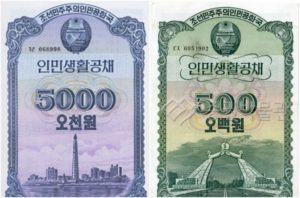
Some argue that European governments should continue to provide leadership with regards to UN sanctions, as well as to civic groups to continue monitoring human rights abuses in DPRK. They believe that governments and civic groups should remain realistic when evaluating how European food aid to DPRK might be misused. How else can anyone outside this secretive country know what’s going on there. “The authorities continue to impose severe restrictions on freedom of movement and access to information,” reported Amnesty International in 2019. “Widespread and systematic controls over the daily lives of people and frequent pressing of the public into labour mobilisations severely affected the enjoyment of human rights.” And it gets worse. “Foreign media reported several public executions. People in detention experienced torture and other ill-treatment and harsh conditions,” the report says. You might imagine that people would want to leave the country. Perhaps they would like to, but it remains illegal to do so without prior consent. Even moving to another province involves paying bribes to government officials and even to policemen. Those living close to any borders, to the demilitarised zone or to any major military facilities are kept under close surveillance.
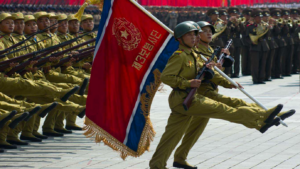
Kim has, like his father and grandfather before him, stressed the importance of self-reliance for his people. The policy is called Juche and it involves North Korea trying to provide everything its citizens need without having to import anything. It sounds like a fine idea, except that it means many people have to go without because, to be blunt, North Korea cannot supply all of its citizens’ needs (and certainly not all of its citizens’ wants). And Kim seems not to have learned that if you invest in an arsenal of massive ICBMs, rather than, say, better housing or more advanced medical equipment, something has to give. Even so, in his tear-filled speech, Kim blamed his country’s economic hardships on international sanctions, the COVID-19 pandemic and an unfortunate bout of typhoons and floods.
His tears may have been genuine; Kim sees himself as a more ‘touchy-feely’ kind of leader than his remote and unemotional father and less militaristic (theoretically) than his grandfather, who took charge of the country in 1948.This Kim stops to pick up babies and children in the crowds that gather to see him. Denied access to overseas media, his people seem to genuinely admire and like him. Of course, they never hear other points of view or read reports by non-DPRK journalists.It’s impossible for anyone to criticise him at home, so the North Korean public cannot make comparisons.
BUY SOME – OR ELSE…
Kim announced the new bond issue on 11 April, 2020 and the relevant cabinet committee was informed that they were printed and ready four days later. According to the Seoul-based Korean journal Daily NK, the country’s officials have ordered organisations in need of state funds to purchase raw materials or supplies to pay for them with bonds, rather than cash. The bonds will then be used by organisations to purchase manufactured goods from those same factories, also by using bonds. What goes around, comes around, as the saying goes. The journal reports that such organisations as Construction Bureau 8, which is the lead contractor in building Pyongyang General Hospital would be obliged to use public bonds, rather than cash, to buy cement from a cement factory. It seems that some 60% of public bonds are allotted to organisations like Construction Bureau 8 but a further 40% are being (or have been) sold to well-off individuals, which means that the country’s wealthy entrepreneurial class, known as donju, who require funds in order to operate their businesses, will be able to buy the required bonds directly from the central bank.
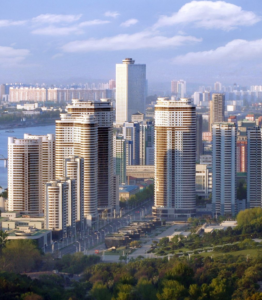
It sounds like a plan that might work, but members of the donju are not happy about it. They see it as a clumsy attempt at a temporary fix for the country’s struggling economic system.
“The government failed to raise the funds it needed when it last floated bonds back in 2003,” Daily NK reports another source as saying, “the government is returning to this already failed way of doing things and only factories and business people will suffer.”
The newspaper also told its readers that the Ministry of State Security (MSS), the country’s feared security agency, reportedly sent out teams on April 17 to crack down on anyone they found exchanging North Korean won for foreign currency. “Money dealers have disappeared after it was made known that the MSS would arrest them for peddling dollars,” the Daily NK reported. “Donju in Pyongyang are desperate to buy up dollars but there’s nowhere to buy them,” the newspaper’s source added. Factories are being pressured to purchase the bonds and donju may face legal punishment or damage to their businesses if they fail to buy the bonds, Daily NK sources warned.
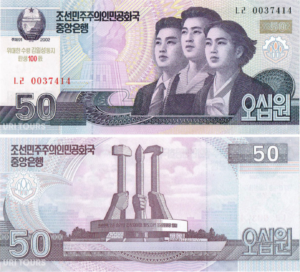
In response to the plan to float public bonds, high-level regime officials are reportedly starting to hoard US dollars, but they’re very hard to find and dangerous to hold. The Diplomat magazine finds it hard to credit that anyone outside of North Korea would consider the country’s bonds as a serious investment. “North Korea’s economy collapsed decades ago,” it writes. “Its credit rating has become meaningless due to extended sanctions by the international community. Moreover, capital and financial transactions with North Korea, as well as financial transactions through third countries, have been virtually impossible from the early 2000s until now. Put simply, there are no reasons to even consider North Korean bonds as an investment tool.” But of course, if you’re a donju you don’t get much choice.
The bond issue comes as cross-border and internal travel restrictions, put in place to halt the spread of the coronavirus, have severely disrupted domestic commerce and also cut critical trade links along North Korea’s 1,420 kilometre border with China. “Suddenly issuing that amount of debt, in one year, is a big deal,” says the Financial Times. “I think this is the first real sign that they are under very significant financial stress as a result of sanctions and result of the virus,” the paper was told by Peter Ward, a Seoul-based researcher into North Korea with the University of Vienna. The donju (and anyone else seen as relatively well-off) have been strongly urged to ensure they pay their full amount of taxes. According to the FP (Foreign Policy) website, “The Minju Chosun, a powerful government-run newspaper in North Korea, called on factories and businesses to fulfill their tax obligations so that the state could meet its plans to grow the budget 4.2 percent this year. That seems an impossibility at this point.” Apparent impossibilities have seldom deterred Kim. “The aim of the debt issuance,” reports FP, “is to collect as much foreign currency circulating in the country as possible.
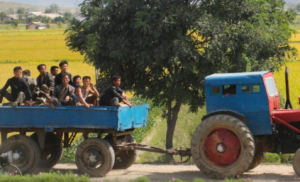
The issuance will be massive, reportedly covering 60 percent of the budget. (In comparison, South Korea’s deficit financing will rise to only 16 percent of its expenditure in 2020.)”.
It is not stated, but is clearly indicated, that anyone not subscribing to this bond issuance will not be popular in Pyongyang. Indeed, the donju will have to buy up the 40% available to them if they want the required paperwork to run their businesses.
NON-INVESTORS IN TROUBLE
The risks may be greater than not being able to operate their businesses. According to Amnesty International, the North Korean government continue to operate four known political prison camps, although they deny they exist. “Up to 120,000 detainees in the camps were subjected to torture and other ill-treatment, forced labour, and harsh conditions including inadequate food,” Amnesty claims. “Many of them had not been convicted of any internationally recognisable criminal offence and were arbitrarily detained without fair trial just for exercising their rights, such as the freedom to leave their own country. They had no access to lawyers and family. Others faced forced seclusion in remote mountainous areas solely for being related to prisoners deemed a threat to the state or for ‘guilt-by-association’.”
As outsiders, we are not allowed to buy the new bonds, but North Korea’s unfortunate businesses and middle-class citizens are not allowed not to. According to the American website Nasdaq.com, “”The last time the government issued bonds, it was alleged that they essentially coerced individuals and businesses to purchase these and they eventually became a vehicle for transaction,” wrote Fitch Solutions, the credit and country research unit of Fitch Group, in a report on May 22. “It is not known whether that is the case this time, although some Western commentators have pointed to the likelihood that it is. In any case, investing in North Korea’s debt is not for the fainthearted, since it has never repaid any of its offshore borrowings.” Not a tempting offer, then. The website reports that “Pyongyang’s loans from Western governments were repackaged into zero-coupon bonds after it stopped servicing the debt in the 1980s, and turned into a €163-million (US$183-million) piece denominated in Deutschemarks and a 240m Swiss franc (US$250-million) tranche, both of which were supposed to mature in March this year but are believed to be outstanding.” If you were tempted to invest, the advice is ‘don’t’, even if you could. After the bond issue was announced, the black-market value of the North Korean won went down, which could mean that foreign currency savings were involved, according to some experts.
The Nasdaq website warns that: “Another Seoul-based researcher estimated that North Korea’s commodity trade deficit was US$2.3-billion last year and would have worsened this year. He believes that North Korea is currently suffering from deflation, because both supply and demand are down after it closed its border with China in January to limit the spread of coronavirus.” Given its dire economic circumstances, then, how on Earth does North Korea afford the research and construction of massive nuclear weapons? Al Jazeera believes it knows: “The answer is through Bureau 39, a secretive organisation hidden deep inside the government apparatus,” it reports. “Its aim is to procure foreign exchange, by any means possible, to fund Kim Jong Un’s regime. From printing counterfeit dollars and profiting from slave labour sent overseas, to illegally selling arms, committing insurance fraud and widespread computer hacking, the inventiveness of North Korea’s sanction busters knows no bounds.”


Do we need to be afraid? Well, possibly. Most of Pyongyang’s missile research has been into weapons that could be used against North Korea’s neighbours. But there have been scarier test flights that suggest that North Korea could put a missile into space and bring it down on a chosen target, presumably a United States interest. And Kim has the theoretical support of China, the news agency Reuters reports. “In a congratulatory message to Kim Jong Un for the founding anniversary of North Korea’s ruling party,” it says, “Chinese President Xi Jinping said he intends to deepen relations with Pyongyang, North Korean state media reported on Saturday. ‘We have an intent to successfully defend, consolidate and develop the China-Korea relations together with Korean comrades and propel the long-lasting and stable development of the socialist cause of the two countries’, North Korean state news agency KCNA quoted Xi as saying.”
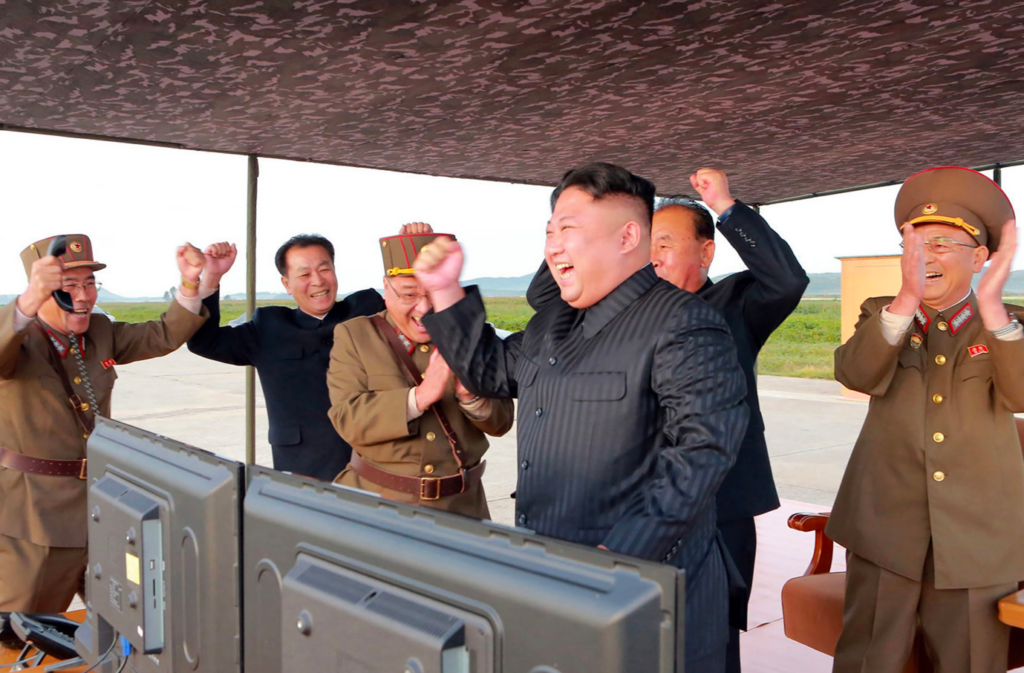
Certainly, Kim’s latest ICBM proves something. He seems to believe it proves that he is a force in the world, a global superpower, even though he is not, and his country is broke. Australia’s 9 News argued that it proves something else, even if its arrival at the parade was impressive. “The massive weapon was carried by an 11-axle truck during a military parade in the capital of Pyongyang to mark the 75th birthday of the isolated state’s ruling party on the weekend,” the news channel reported. “Malcolm Davis, senior analyst at the Australian Strategic Policy Institute, told Nine.com.au the display of the new ICBM shows that the Trump Administration’s talks with North Korean leader Kim Jong-un had failed.” Kim might take some comfort from the fact that he has embarrassed President Donald Trump. It’s a small victory but still a victory of sorts.
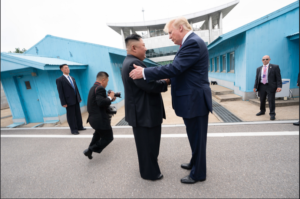
9 News points out that the new weapon is proof of Trump’s failure to denuclearise the Korean peninsula. “Kim and Donald Trump have met three times since 2018 for talks about North Korea’s nuclear weapons without concrete results. ‘Trump has to recognise he has failed … Kim has basically played him for a sucker,’ Dr Davis said.” Within 24 hours, the government of South Korea held an emergency meeting to discuss this worrying development. It’s probably true to say that Seoul has little to fear from the ICBM; its intended targets lie further afield, probably across the Pacific Ocean. But ISBMs are notoriously difficult to defend against. “like trying to stop a bullet that’s heading for you by firing another bullet at it,” is how one experts described it. More worrying, perhaps, is Russia’s successful testing of its new Zircon hypersonic cruise missile, launched from a warship in the White Sea, to the north of Russia and – with present technology – impossible to detect or deter once it’s in the air. There is no guarantee that President Vladimir Putin will be any more responsible in his deployment of missiles than Kim. Both like to surprise people.
Does any of this matter in Europe? After all, Pyongyang is 8,500 kilometres away from Brussels and it’s unlikely that even Kim’s latest ICBM could reach that far.
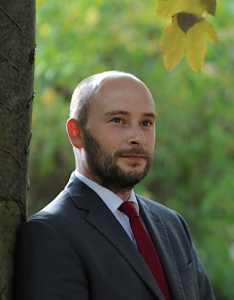
But Europe could help, according to Doctor Eric J. Ballbach, director of the North Korea and International Security research unit at the Institute of Korean Studies at the Freie Universität Berlin, writing for the Real Instituto Elcano. He argues that the EU can make valuable contributions in the field of the economy, which would make all the difference in providing inducements that will lead to more successful outcomes in negotiations over the nuclear issue. “The high priority now being given to economic development by the Kim Jong-un leadership provides a number of potentially attractive opportunities and measures to encourage and support a new nuclear negotiation,” he argues. “Critical Engagement has been the EU’s official North-Korea policy for well over two decades now.” He believes, however, that Critical Engagement did not promote mutual understanding and proposes academic exchanges as a way to lift the curtain on this secretive state.
“This paper has aimed at critically reflecting on the strategy and argued that Critical Engagement did not promote a comprehensive European strategy for the Korean peninsula in general and North Korea in particular,” writes Dr. Ballbach. “The strategy has proved to be highly dependent on political circumstances and has failed both on the level of its strategic objectives and of its strategic calculation, thereby further weakening Europe’s role in East-Asian security affairs. Against this background it is imperative to initiate a sober debate on the outlines of a new strategic approach, one that puts the EU in a stronger position to proactively contribute to the maintenance of peace and stability on the Korean peninsula.”
NBC News reminded readers that North Korea and the United States are technically still at war. The Korean War of 1950-53 ended in a truce, not in peace. Shortly before the 75th anniversary parade, a South Korean fisheries official was killed by North Korean troops, causing fury in Seoul. It’s supposedly linked with spying but, worryingly for South Korea, suggests their northern neighbour knows about their intelligence-gathering techniques. Kim himself, of course, is quite unfathomable. How much of his new ICBM was paid for by extracting funds from companies and from the donju is something we may never know. But unless you were hoping to buy any North Korean bonds it probably doesn’t matter. I wouldn’t bother, if I were you.

